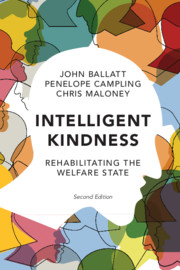Book contents
- Intelligent Kindness
- Reviews
- Intelligent Kindness
- Copyright page
- Contents
- Foreword
- Authors’ Note
- Chapter 1 The Heart of the Matter
- Chapter 2 Rescuing Kindness
- Chapter 3 A Politics of Kindness
- Chapter 4 Building the Case for Kindness
- Chapter 5 Managing Feelings of Love and Hate
- Chapter 6 The Emotional Life of Teams
- Chapter 7 Cooperation and Fragmentation
- Chapter 8 On the Edges of Kinship
- Chapter 9 Unsettling Times
- Chapter 10 Free to Serve the Public?
- Chapter 11 Blame
- Chapter 12 The Hostile Environment
- Chapter 13 The Pull towards Perversion
- Chapter 14 Cultivating Intelligent Kindness
- Chapter 15 Rehabilitating the Welfare State
- Index
- About the Authors
- Acknowledgements
- References
Chapter 2 - Rescuing Kindness
Published online by Cambridge University Press: 28 February 2020
- Intelligent Kindness
- Reviews
- Intelligent Kindness
- Copyright page
- Contents
- Foreword
- Authors’ Note
- Chapter 1 The Heart of the Matter
- Chapter 2 Rescuing Kindness
- Chapter 3 A Politics of Kindness
- Chapter 4 Building the Case for Kindness
- Chapter 5 Managing Feelings of Love and Hate
- Chapter 6 The Emotional Life of Teams
- Chapter 7 Cooperation and Fragmentation
- Chapter 8 On the Edges of Kinship
- Chapter 9 Unsettling Times
- Chapter 10 Free to Serve the Public?
- Chapter 11 Blame
- Chapter 12 The Hostile Environment
- Chapter 13 The Pull towards Perversion
- Chapter 14 Cultivating Intelligent Kindness
- Chapter 15 Rehabilitating the Welfare State
- Index
- About the Authors
- Acknowledgements
- References
Summary
The word ‘kindness’ evokes mixed feelings in the modern world. To begin this exploration of its importance and the value of making it central to improving health and social care, it is important to bring into focus what it is we are discussing. This means attempting a definition. More importantly, it means rescuing the concept (and what it indicates) from the grip of a range of social and cultural forces that obscure, warp and denigrate what kindness is, marginalise it in the debate about what matters, and make it more difficult to be kind.
As an adjective, kind means being of a sympathetic, helpful or forbearing nature and, importantly for our argument, being inclined to act to bring pleasure or relief. It is important to keep the word rooted in its deeper meanings, though. It can easily become a mere synonym for individual acts of generosity, sentiment and affection, for a general, fuzzy ‘kindliness’.
- Type
- Chapter
- Information
- Intelligent KindnessRehabilitating the Welfare State, pp. 9 - 19Publisher: Cambridge University PressPrint publication year: 2020



